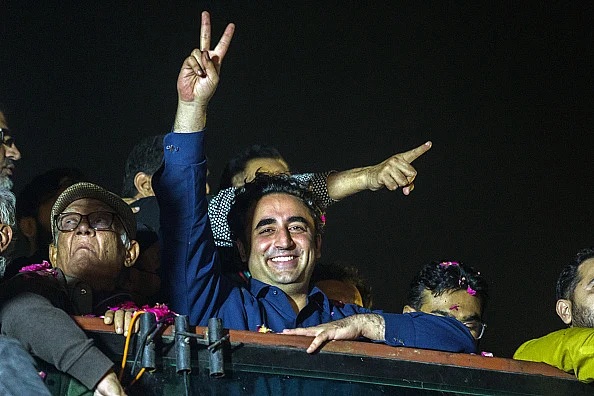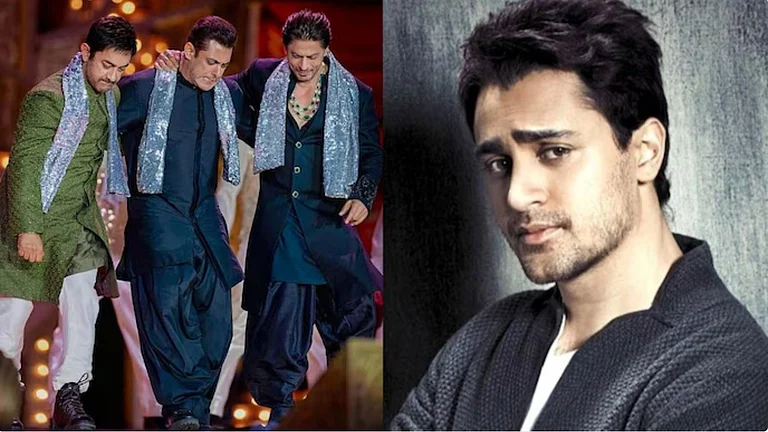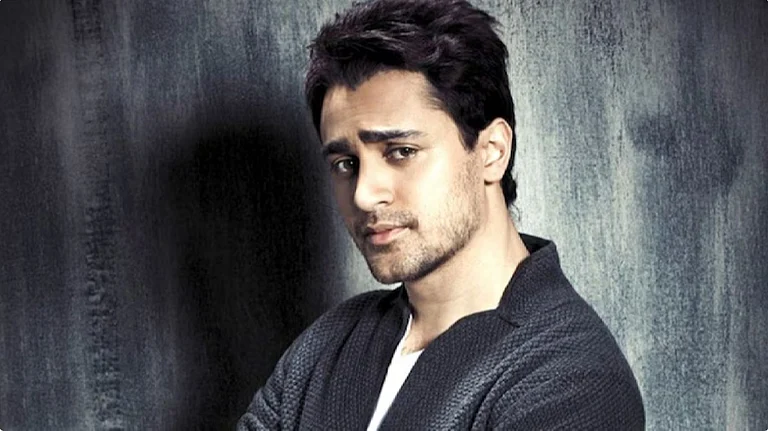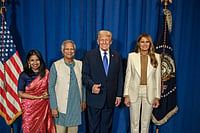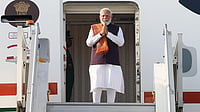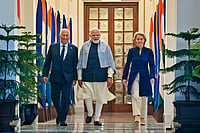Bilawal Bhutto, son of Pakistan’s first woman prime minister Benazir and grandson of Zulfikar Ali Bhutto, is gradually emerging from father Asif Zardari’s shadow. Thursday’s elections are a major test for Bilawal and whether his Pakistan People’s Party (PPP) can make its presence felt beyond the family bastion of Sindh. The party once had support across the country, but today it is a shadow of its old self and has been wiped out from Punjab. Bilawal is addressing meetings in Punjab and hoping to revive the party fortunes here. Bilawal is contesting from Lahore in Punjab to show that the PPP means business. Like UP in India, Punjab decides the fortunes of political parties.
Bilawal is not new to politics. When his mother was killed by a suicide bomber in 2007, he was in his first semester in Oxford. He quickly changed his name to Bilawal Bhutto Zardari, as did his two sisters. Bilawal was the apparent heir and was installed as chair of the Pakistan People’s Party. His father Asif Zardari, a shrewd political politician was made the co-chair and managed party affairs while Bilawal completed his education. Bilawal took his first shot at the government when he became foreign minister in the coalition government that took over from Imran Khan. As the country’s youngest foreign minister Bilawal made a few mistakes, calling Modi names but his overall performance was good.
These elections will be a test for Bilawal as he has taken on the mantle of the main campaigner for his party. The PPP was first off the ground and began electioneering much before the other parties. He has been campaigning tirelessly across the country, including in Baluchistan and the Khyber Pakhtunkhwa, restive provinces which many political parties have avoided thanks to the security situation. Bilawal has toured these areas extensively and addressed large rallies.
His father Asif Zardari, had spent nearly 12-years in jail and has proven his worth by refusing to compromise with the authorities to buy his freedom. But he is more of a backroom boy and has worked on strategic alliances to keep the party relevant. The PPP has lost much of its former lustre, but remains in power in the Bhutto family stronghold of Sindh. This helped to keep the PPP relevant in national politics, despite it losing support in every other province. Imran Khan repeatedly called out the Bhutto-Zardari clan and attacked them relentlessly. PTI supporters carried on their leader's campaign on social media, and tarnished the image of the party. The fact that Zulfikar Ali Bhutto was sent to the gallows by military dictator Zia-Ul-Haq, or that Benazir Bhutto was killed by a suicide bomber, have all been forgotten by younger Pakistanis, who idolize Imran Khan and regard both the PPP and the PML as chors who looted country. Zardari does not have either the personality or the charisma of the Bhutto’s. So the public face of the party is the 35-year old heir to the Bhutto political inheritance. Bilawal was often the butt of jokes for his elitist background and his anglicised Urdu. Pakistanis are great at memes and Bilawal was subjected to endless memes and trolling at the start of his career. He has over time polished his language and is now a much improved Urdu speaker.
Being a dynast is both a blessing and a curse in today’s world. Dynasts come with the family baggage. Youngsters, across South Asia, struggling to build careers in a highly competitive tough environment regard dynasts with distaste as people born with innate advantage of birth and believe there is no place for them in today’s egalitarian and democratic times. Yet many of the older generation have a special place in their heart for him for being Benazir’s son. These are apart from Pakistan People’s Party (PPP) loyalists. Dynasts also inherit a ready-made party structure that would otherwise take decades to build.
However it is not enough to be the inheritor of the family brand, as Rahul Gandhi, another dynast is fast realising. The brand has to appeal to the younger generation and change with the times. The party has to offer something to the disillusioned youth, most of whom are supporters of Imran Khan who had for years campaigned against the Bhuttos and Sharifs. To the majority of the young, both the PPP and the PML(N) are parties headed by tired old men with nothing to offer to the aspirational first time voters.
Bilawal is trying to infuse young blood into the PPP. Young voters make up a significant percentage of the electorate. The number of first time voters have also increased substantially to roughly ten million, from 46.43 million in 2018 to 56.86 million in 2024. Nearly 60 per cent of Pakistan’s population is young, so appealing to this segment is essential to win elections. Imran Khan as a dashing cricket captain had always had a connection with youth, but he has been able to turn their admiration into a solid political base. Most of his stormtroopers are young people ready to give their lives for their hero.
According to reports in the Pakistani media, Bilawal has attempted to bring in young people to the party and wants the old guard to stay home. Since November last year, Bilawal has been openly calling for a fresh look for the party and advised the older generation to stay home and rest. They have had their innings and now should leave it to the next generation to solve Pakistan’s problems. His statements against the old guard first as foreign minister in a speech in the National Assembly and later repeatedly in the campaign trail had ruffled many feathers.
Stalwarts, most of them Zardari loyalists are uncomfortable and have complained to the father. Zardari openly rebuked his son, saying he was “emotional and inexperienced” and assured the old guard not to take Bilawal seriously as he continues to call the shots and was in charge of ticket distribution. All this was said in a widely circulated television interview of Asif Zardari. Nobody is certain whether this is play acting or there are real differences. After Asif Zardari’s interview, the young man flew off to Dubai, leading to more speculation. Two days later, Zardari and his sister, who is a close confidante of her brother, followed Bilawal to Dubai. PPP leaders said that these trips were scheduled, but few bought the line.
Soon after Benazir Bhutto was killed in a terror attack when Zardari took over the party, the former prime minister’s friends were furious. They had never taken to Benazir’s husband and believed he was responsible for her downfall. After all during Benazir’s time as PM, Zardari was nicknamed Mr. 20 per cent as all major deals done during that time had to give 20 per cent to the PM’s spouse. How far this is true is not known, but the label of corruption has stuck to the Bhutto-Zardari clan.
The new chairman got rid of many of Benazir loyalists, and brought in his own people to the party. But with time, the Benazir loyalists have also come around to accepting Zardari. He has ensured that the PPP government completes a full five year term under his leadership, a rarity in Pakistan. Even Benazir with all her charisma could not last. Zardari is a great back room strategist and has the ability to reach out over the political divide whether with the all powerful military establishment or with other political parties and groups.
Bilawal Bhutto is now training his guns on Nawaz Sharif’s Pakistan Muslim League. With Imran Khan out of the race the elections have to be fought once more between the PPP and the PML(N). In a couple of interviews to television channels, Bilawal has accused Nawaz Sharif of now being the candidate of the military establishment, much as Imran Khan was in the 2018 elections. The Pakistan Democratic Movement (PDM) was formed by both the PPP and PML as well as other opposition parties to promote democracy and to launch a political movement against the military’s interference with elections. Today, the army is doing exactly what it did in 2018, but this time Nawaz Sharif is the chosen one.
Bilawal says that Nawaz Sharif is depending on the establishment to win elections for him and is therefore not going out to campaign. Sharifs have not gone out campaigning in full steam and there is no excitement this time about the elections. Pakistan society is deeply divided and Bilawal is calling for an end to the politics of hate that had seen parties in power go after opposition leaders and put them behind bars. Imran Khan while in office had put hundreds of PPP and PML workers and leaders behind bars and ensured that they were kept in harsh conditions. Today, Imran Khan is in jail but has access to newspapers, television and visitors, something he never allowed his opponents.
Bilawal’s campaign against hate may appeal to some people but more important is the ten point economic charter that plans to downsize 17 federal government departments to save Rs 300 billion for welfare projects. He has also promised to scrap Rs 1,500 billion paid annually to the rich as tax concessions and provide the funds instead to those who desperately need help. “Rethinking development” with emphasis on green energy, solar power and a strategy to fight climate change is big on the PPP agenda. The devastating floods in Sindh last year has shown that unless efforts to fight climate change are put in place it may be too late to save the region. The Himalayan glaciers are melting, leading to massive floods and at one point the water sources could dry up. Bilawal is also talking of mental health and the need to help young people fighting drug addiction, depression and other mental issues. His sister Assefa Bhutto Zardari, has also been campaigning for her brother. “PPP is fighting for you. We will bring welfare projects for you,” she said. “Vote for Bilawal on Feb 8 and we will solve all your problems,” she said in an election meeting in Sindh.
The Bhutto scion is campaigning relentlessly to rejuvenate the PPP. No one expects the PPP to win a majority, with the establishment said to be backing Nawaz Sharif, but the party is hoping to make an impact outside Sindh this time. Bilawal is hoping to win back some of the space it had conceded to the Pakistan Tehreek-e-Insaf and the PML(N). Though Sharif's stronghold had always been Punjab, the party had given ground to the PTI in recent years. Bilawal is now ready to capture that space. Whether he succeeds will be clear after the elections, but Bilawal is in Pakistan for the long haul and bent on giving the PPP a new look.







